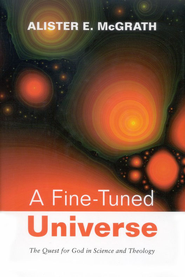Alister McGrath: A Fine Tuned Universe
 Alister E. McGrath, A Fine-Tuned Universe: The Quest for God in Science and Theology (Louisville: Westminster John Knox, 2009), xv + 262 pages.
Alister E. McGrath, A Fine-Tuned Universe: The Quest for God in Science and Theology (Louisville: Westminster John Knox, 2009), xv + 262 pages.
Alister McGrath is Professor of Theology, Ministry, and Education at King’s College, London, holding doctorates in both the natural sciences and theology. This title could be seen as an extension of his title from 2008, The Open Secret: A New Vision for Natural Theology, being a reformulation of his 2009 Gifford Lectures. In this newest title, McGrath examines the apparent ‘fine-tuning’ of the universe and its significance – if any – for natural theology. In so doing, he explores a wide range of physical and biological phenomena and draws on the latest research in biochemistry and evolutionary biology. He purports to set out an approach to natural theology within the context provided by a distinctly Trinitarian framework. Notably, he does not attempt to ‘prove’ the existence of God or the truth of Christian teaching; instead, McGrath’s claim is that there is a coherent ‘fit’ between the observable world and the resources of Christian tradition. The book is divided into two sections, the first of which sets out his ‘Trinitarian Natural Theology’ (seven chapters), and the second of which gives a case study, of sorts, regarding the apparent fine-tuning of the universe, or the so-called ‘anthropic principle’ (seven chapters). The majority of what follows will focus on the first part of McGrath’s text, note.
Of particular significance, the second chapter reviews the crisis of confidence in modern natural theology, which leads him to posit a renewed vision for natural theology in chapter three. The fourth chapter discusses possible challenges to his proposal, whereas the fifth provides his argument that natural theology should be seen as an endeavour that seeks consonance between theology and science. Chapter six purports to be a presentation of the ‘dynamics of a Trinitarian natural theology’, whereas chapter seven approaches the idea of counterfactuals. The eighth chapter, which could very well be seen as the core of the book, is a re-reading of St. Augustine, during which McGrath argues that Augustine’s creation theology provides resources for making sense of both the origins of the universe and the processes of Darwinian evolution. Chapters nine through fourteen all highlight the apparent fine-tuning and directionality present within the universe. The constructive portion of the book ends with some reflections on what the relatively recent developments within the emergence debate might entail for natural theology; McGrath promises, in a footnote, to address these issues more fully in subsequent titles.


